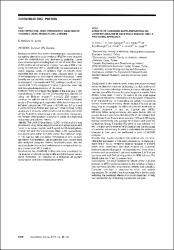Effects of curcumin supplementation on liver metabolism in rats fed a high-fat diet: A proteomic approach

Göster/
Erişim
info:eu-repo/semantics/openAccessTarih
2013Yazar
Koçak, HikmetÖner-İyidoğan, Yıldız
Baykal, A.T.
Seyithanoğlu, Muhammed
Çevik, A.
Gürdöl, Figen
Uysal, Müjdat
Üst veri
Tüm öğe kaydını gösterKünye
Kocak H, Oner-Iyidogan Y, Baykal AT, Seyithanoglu M, Cevik A, Gurdol F, Uysal M. Effects of curcumin supplementation on liver metabolism in rats fed a high-fat diet: A proteomic approach. Biochimica Clinica. 2013; 37:S266. 20th IFCC-EFLM European Congress of Clinical Chemistry and Laboratory Medicine (EuroMedLab)Özet
Background: In the modern world, many individuals routinely consume diets rich in animal fat, leading to a high incidence ofobesity. Curcumin (diferuloylmethane, turmeric) extracted from the dried root of the rhizome Curcuma longa, is a popular Asian dietary spice used in curry. Curcumin is the most active component of turmeric, comprising 2-8% by weight. Proteomics is an important tool for elucidating the cellular response to various treatments including dietary factors.
Kaynak
Biochimica ClinicaCilt
37Bağlantı
https://hdl.handle.net/11446/537http://www.sibioc.it/upload/bc/37/SS/917_189-291_Monday.pdf

















